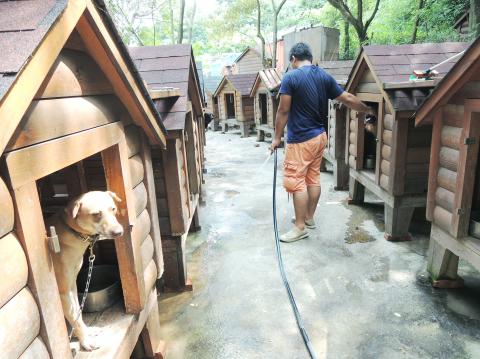A man who built 30 mobile doghouses for stray dogs on his own land on Baguashan (八卦山) in Changhua County has been slapped with a notice of illegal construction by the county government, which lawyers and veterinarians have called “strange” and “questionable.”
Thirty-three-year-old Wei Ta-wei (魏大惟) bought 7 fen (分) of land (0.6789 hectares) early last year and founded the Yong Fong Foster Farm to take in stray dogs.
Wei said that taking the dogs in meant they would not be hit by cars or chased by people in the mountains, and that at most he kept about 80 stray dogs, with 60 being the average.

Photo: Wu Wei-kung, Taipei Times
Wei said that on average, the animals consumed roughly NT$30,000 (US$1,000) in feed per month, adding that he had already gone through NT$2 million in savings just by setting up the farm and feeding the animals.
“I also volunteered to be an assistant for veterinarians, as well as working at pet hotels, for experience,” he said.
Wei said he was shocked to receive the notice from the Changhua County Government, adding that the doghouses were mobile and did not fit the “fixed housing” clause as stated in the Construction Act (建築法).
Wei said he did not understand why the doghouses would be illegal.
“I thought I helped the county government solve its problems of stray dogs, but the county government is trying to persecute me,” Wei said.
Wei said he only wanted the dogs to have a place to live, and that he did not mind if the government did not wish to help, but he hoped they would not persecute him without basis.
Lawyer Chao Hui-ju (趙惠如) said no one could accuse a mobile doghouse of being an illegal construction, adding that such an accusation was in itself strange.
Another lawyer, Chen Chien-liang (陳建良), said that if a doghouse is not fixed on the ground, it could not, according to the Construction Act, be considered a building and therefore is not an illegally constructed building.
Changhua County Veterinarian Union councilor Lin Shih-hsien (林世賢) said the foster home was the best he had ever seen.
The county government’s findings are questionable, he said.
Changhua County Government Animal Disease Control Center Director Tung Meng-chih (董孟治) said that the foster home gave excellent feeding to the animals in its care and also helped the county government in controlling the stray dog problem.
Wei said he had appealed the notice and his appeal was currently being discussed at the Ministry of the Interior, adding that if the county government’s notice were repealed, he would not have to take down the doghouses.
According to county government construction division official Wang Meng-kui (王盟貴), the county government made the decision based on its official inspection, but added that if the doghouses were indeed mobile, the county government was willing to reconsider the status of the doghouses.
“We would not arbitrarily take down the doghouses,” Wang said.

Japanese footwear brand Onitsuka Tiger today issued a public apology and said it has suspended an employee amid allegations that the staff member discriminated against a Vietnamese customer at its Taipei 101 store. Posting on the social media platform Threads yesterday, a user said that an employee at the store said that “those shoes are very expensive” when her friend, who is a migrant worker from Vietnam, asked for assistance. The employee then ignored her until she asked again, to which she replied: "We don't have a size 37." The post had amassed nearly 26,000 likes and 916 comments as of this

US President Donald Trump said "it’s up to" Chinese President Xi Jinping (習近平) what China does on Taiwan, but that he would be "very unhappy" with a change in the "status quo," the New York Times said in an interview published yesterday. Xi "considers it to be a part of China, and that’s up to him what he’s going to be doing," Trump told the newspaper on Wednesday. "But I’ve expressed to him that I would be very unhappy if he did that, and I don’t think he’ll do that," he added. "I hope he doesn’t do that." Trump made the comments in

Tourism in Kenting fell to a historic low for the second consecutive year last year, impacting hotels and other local businesses that rely on a steady stream of domestic tourists, the latest data showed. A total of 2.139 million tourists visited Kenting last year, down slightly from 2.14 million in 2024, the data showed. The number of tourists who visited the national park on the Hengchun Peninsula peaked in 2015 at 8.37 million people. That number has been below 2.2 million for two years, although there was a spike in October last year due to multiple long weekends. The occupancy rate for hotels

A cold surge advisory was today issued for 18 cities and counties across Taiwan, with temperatures of below 10°C forecast during the day and into tonight, the Central Weather Administration (CWA) said. New Taipei City, Taipei, Taoyuan and Hsinchu, Miaoli and Yilan counties are expected to experience sustained temperatures of 10°C or lower, the CWA said. Temperatures are likely to temporarily drop below 10°C in most other areas, except Taitung, Pingtung, Penghu and Lienchiang (Matsu) counties, CWA data showed. The cold weather is being caused by a strong continental cold air mass, combined with radiative cooling, a process in which heat escapes from